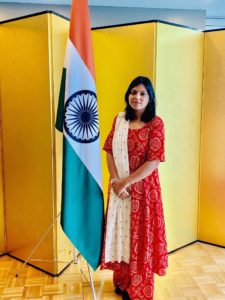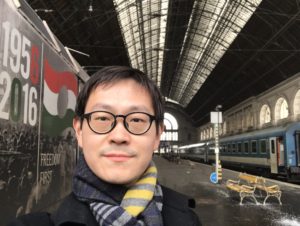若手研究員からのメッセージ・Message of Research Fellows
Akanksha Singh

My Latest Publications:
Published Article-Akanksha Singh-VESTNIK SPBU
Published-Co Author Article-Akanksha Singh, Kumiko Haba-Aoyama Journal of International Studies
————————————————————
My current research interest lies in the field of energy security, energy geopolitics, international cooperation and integration. Throughout my studies in international relations and research in energy security and energy geopolitics, I have expanded my interest in regional cooperation and integration for sustainable development. To promote regional cooperation and integration, I am presently researching on the various prospects of Regional Cooperation in Asia, through the lens of energy security, regional organizations and others.
The present research proposal aims to connect energy security as a factor in maintaining the regional integration process from the functionalist perspective. Including regions of the Middle East, Caspian Basin, and Russian reserves, Asia is the largest producer of oil and natural gas in the world. Integrated Asia would facilitate towards the uninterrupted supply of energy resources to the rapidly developing Asian economies. Energy security has the potential to create a new regional and international cooperative framework. Taking lessons from the European Union, regional cooperation in Asia may emerge as the best diplomatic tool towards Asian unity. Political integration and reconciliation in Europe began with European economic integration after centuries of war and conflicts. Considering the vastness of Asia, this study would focus mainly on Central and South Asia and would particularly carve out the geostrategic significance of India in South Asia and Kazakhstan in Central Asia. Firstly, in this research I will do a comprehensive analysis about the concept of regional integration, geopolitics and energy security theoretically, from the perspective of EU model to find out opportunities and challenges for Asian region to bind as a single entity. Secondly, there will be case analyses of India in South Asia and the role of Kazakhstan in Central Asia.
I am sincerely thankful to Professor Dr. Kumiko Haba, Founding Director, Institute of Global International Relations, Aoyama Gakuin University, for kindly providing me the research opportunity as a Research Fellow at the institute and it is an honour for me.
――――――――――――――――――――――――――――――
Soavapa NGAMPRAMAUN
Soavapa NGAMPRAMAUN is an Assistant Professor at the Department of International Relations, Faculty of Political Science, Ramkhamhaeng University, Bangkok Thailand. Her research interest is involved comparative politics and international relations between EU and ASEAN, regionalism, ASEAN Studies and Mekong Sub-region. She has been recently a visiting professor at School of International Politics, Economics and Communication, (SIPEC), Aoyama Gakuin University, Tokyo, Japan from September 2016 to September 2019 under supervision of Prof. Kumiko Haba for doing research Project on Comparative Analysis of Sub-regional Processes in Europe and Asia: The EU Strategy for Danube Region (EUSDR) and Greater Mekong Sub-region (GMS) as a case study. She has just finished research about Lancang-Mekong Cooperation (LMC) Impacts on Thailand 4.0 and Eastern Economic Corridor (EEC), Grant by Research Institute of Ramkhamhaeng University, Bangkok, Thailand from February 2019 – February 2020 .She is currently doing a research project about “the Silk Road Environmental Program: Case Study of Impact of BRI and Thailand in Economic and Social Development in Rayong Industrial Park”. This project is funded by Institute of Geographical Sciences and National Resources Research, Chinese Academy of Sciences, Beijing, China from 1 September 2019 – 30 November 2021.
――――――――――――――――――――――――――――――
Peter Joy Hudson

In this research project, at the Institute of Global International Relations, I am looking at the mechanisms and legislations vis-a-vis energy and climate policies of the European Union. The EU has emerged as a leader, fostering policies within its member states, to switch to renewables and thereby attain its goals towards a greener EU. The decision-making process within the EU, particularly on energy and climate, would be of great interest, since it has repercussions, within the domestic economies of the members, especially the Central and Eastern European states, depending upon how diversified or congruent their energy policy is to the overall EU`s policies. The ambitious agendas and targets set out by the EU like the “European Green Deal” (EGD) and the combined energy and climate packages, will be the focus of my study, using the multi-level governance approach, keeping in mind the diversified interests and the cross-national interests of the various stakeholders involved. As the EGD is also set to align the EU`s strategy to implement the UN`s 2030 Agenda for Sustainable Development, a study on the frameworks and mechanisms in place in the EU, could also be a template, possibly to be replicated in the other regions of the world grappling with the twin challenges of climate change and a quest to find ideal energy mixes, to attain the larger goal of becoming carbon neutral.
――――――――――――――――――――――――――――――
杜 世鑫(Shixin DU, と せきん)

わたしの研究テーマは、欧州・中国国際関係です。そのテーマをとらえる際に、二つの視点を持っています。一つ目は歴史の視点です。中国は、欧州と地理的に遠いにもかかわらず、歴史的には、深い関係を持っています。その象徴的な一つは、1956年の「スターリン批判」をきっかけに起きたハンガリー革命に、中国が深くかかわったことが挙げられます。わたしはこれをテーマにして博士論文を完成し、ハンガリー革命における中国の「ジレンマを内包した介在者」という役割を解明しました。いま一つの視点は、地域協力の視点です。「一帯一路」構想を打ち出した中国は、欧州、特に中東欧とEUとの関係に積極的にコミットするようになっています。その象徴的な一つは、鉄道輸出が挙げられます。わたしは、鉄道輸出における中国の国内政治の変化と、鉄道輸出に対する中東欧とEUとの受け止め方について調べており、鉄道輸出を事例として、「一帯一路」がいかに欧州・アジアの地域協力の架け橋になるのか、というテーマを模索しています。
此度は、大変光栄なことに、グローバル国際関係研究所の特別研究員になりました。ご指導、ご推薦くださった、グローバル国際関係研究所所長の羽場久美子先生にこころより御礼を申し上げます。また、支えてくださった先輩・学友・大学の職員の皆様に、こころから感謝いたします。どうぞよろしくお願いいたします。
My research interest is Europe and China international relations, and regarding this topic, I have two perspectives to approach. One is the historical perspective. China has been held a long relationship with Europe in history, though geographically far distance. One of the significant cases is the involvement of China in the Hungarian Revolution, 1956, for which topic, I wrote my doctoral thesis, and in which, I found the dilemmas of Chinese leader’ decision making. Another perspective is the Regional Cooperation between Europe and Asia. China, promoting ‘Belt and Road Initiative’, is actively engaging herself in building connections with European countries, especially Central Eastern European (CEE) countries and EU. One can tell the significance from the case of infrastructure exports, especially railway constructions. In my research, I want to focus the domestic motivation of China and how the European countries recognition of these constructions. By researching this point, I hope to find the possibility of BRI to contribute to the Regional Cooperation between Europe and Asia.
It is my great honor to be invited as a research fellow of Institute for Global International Relations. I want to thank Professor Kumiko Haba, Dean of the Institute, for her warm instructions and help. And I also want to thank my seniors, colleagues and university staffs for their kind support.